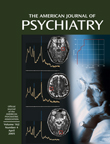The Longitudinal Course of Thought Disorder in Geriatric Patients With Chronic Schizophrenia
Abstract
OBJECTIVE: This study longitudinally assessed previously validated dimensions of thought disorder—verbal underproductivity and disconnection—in geriatric schizophrenia and replicated previous cross-sectional differences in communication disorders. METHOD: Two hundred twenty patients with chronic schizophrenia were assessed with the Thought, Language, and Communication Scale over a mean follow-up period of 2.3 years. RESULTS: Patients had increases in verbal underproductivity but stable scores on disconnection over the follow-up period. Worsening in verbal underproductivity was associated with concurrent worsening in Mini-Mental State Examination scores and older age at baseline. CONCLUSIONS: Verbal underproductivity worsens with aging and is associated with cognitive worsening, although disconnected speech is relatively stable. Some geriatric patients with schizophrenia may lose the skills necessary to report symptoms, leading to the impression that their clinical status is improving.



